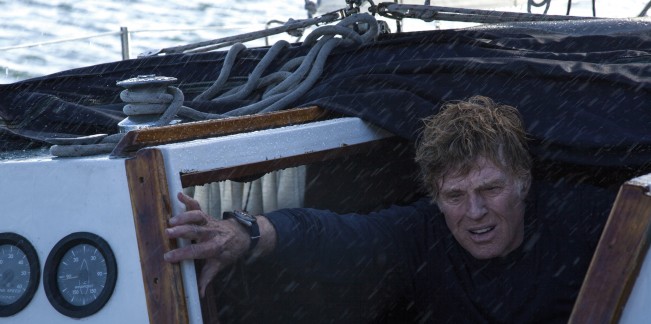By Jake Howell jake.howell@utoronto.ca
Cannes Out-Of-Competition Review: All Is Lost
 J.C. Chandor’s bold sophomore feature All is Lost, the follow-up from 2011’s Margin Call, is something extraordinary in the literal meaning of the term. A one-man show featuring a titanic Robert Redford, the film is a shipwreck narrative that rises above genre expectations (if there is a ship-wreck genre in the first place), with inspired work from everyone involved. This is some of Redford’s finest acting since 1973’s The Sting, and is sure to prove buoyant in the coming awards season. Chandor deserves credit too; his directorial hand is firmly on the rudder in a venture that shouldn’t work but absolutely does.
J.C. Chandor’s bold sophomore feature All is Lost, the follow-up from 2011’s Margin Call, is something extraordinary in the literal meaning of the term. A one-man show featuring a titanic Robert Redford, the film is a shipwreck narrative that rises above genre expectations (if there is a ship-wreck genre in the first place), with inspired work from everyone involved. This is some of Redford’s finest acting since 1973’s The Sting, and is sure to prove buoyant in the coming awards season. Chandor deserves credit too; his directorial hand is firmly on the rudder in a venture that shouldn’t work but absolutely does.
Carrying the film with the strength of Atlas, Redford plays “Our Man,” a recreational yachtsman who is both a savvy sailor and a strong improviser. On a solo cruise afloat the Indian Ocean, disaster strikes: there’s a gaping hole in the hull of the Virginia Jean, which has collided with a floating shipping container (possibly a dig at globalization, given the contents inside). Our Man gets that sinking feeling as his living quarters take on major amounts of water, and the film charts its course from there. Before that, however, we’re treated to All is Lost’s first of only two instances of dialogue: opening the film from black, Redford’s tired voice plays over images of that blasted shipping container, his somber tone in tune with a letter of spiritual surrender. The meaning of the film’s title is self-evident—at this point, all has been truly lost—but we flash back eight days earlier as things begin to go wrong.
Early skepticism surrounding All is Lost boiled down to “how are they going to fill a feature-length film with no dialogue and only one actor?” to which the film replies, “by showing everything this protagonist endures in precise detail.” Indeed, if there is a connection between All is Lost and Margin Call, it’s that Chandor has written another procedural, wanting us to see events with meticulous attention instead of elliptical editing or any other chronological distortion. This is a style commonly associated with extraneous footage, but Chandor’s microscopic focus is the key to propelling the film’s eight-day ordeal. Like a Macgyver of the sea, Redford’s character never stops handling crises; his damaged boat a constant struggle against treacherous weather and churning water. He moves from problem to problem with remarkable calm, fixing issues as they arise with nautical ingenuity and the unflappable will to survive. Whether it’s procuring fresh water or salvaging the last of his supplies, everything Our Man does is given ample screen time, and it’s riveting.
All is Lost is less concerned with what this story is “about” and more with how it all goes down (to be sure, the picture could be summarized in a single sentence). Rather, the actions and subsequent emotions are the narrative here; the expressions on Redford’s face speaking volumes despite the film’s outright lack of dialogue (though a perfectly-timed F-bomb wreaks havoc in the second half of the film). The only thing we don’t see is Our Man’s dreams, hinting that when he shuts his eyes, his thoughts are empty and alone—a reading in sync with the film’s overall feeling of desperation and linear editing.
 The passion on display from both Chandor and Redford is palpable, the 76-year-old Sundance founder ignoring his age to deliver some of the best physical acting in his storied career. Also excellent is the sound design and Alex Ebert’s swelling score: the former textured with creaks, booms, and other noises of foreboding dread, the latter cresting at just the right moments. Notable, too, is the adroit, nimble cinematography, which captures the interiors without feeling cramped and the exteriors with artistic respect to the elements.
The passion on display from both Chandor and Redford is palpable, the 76-year-old Sundance founder ignoring his age to deliver some of the best physical acting in his storied career. Also excellent is the sound design and Alex Ebert’s swelling score: the former textured with creaks, booms, and other noises of foreboding dread, the latter cresting at just the right moments. Notable, too, is the adroit, nimble cinematography, which captures the interiors without feeling cramped and the exteriors with artistic respect to the elements.
Do we know how the film will end? Sure: if you think about it, there are only two real options for a ship-wreck story to play out. But Redford’s lead performance is so nuanced in its emotional range that the film never capsizes from expected beats or cliché, and it’s most certainly not Cast Away or Life of Pi. Against the tides, All is Lost somehow exists as its own breed of survival narrative; one with silent reverence to nature and an adherence to the small-scale that results in overwhelming grandeur.















